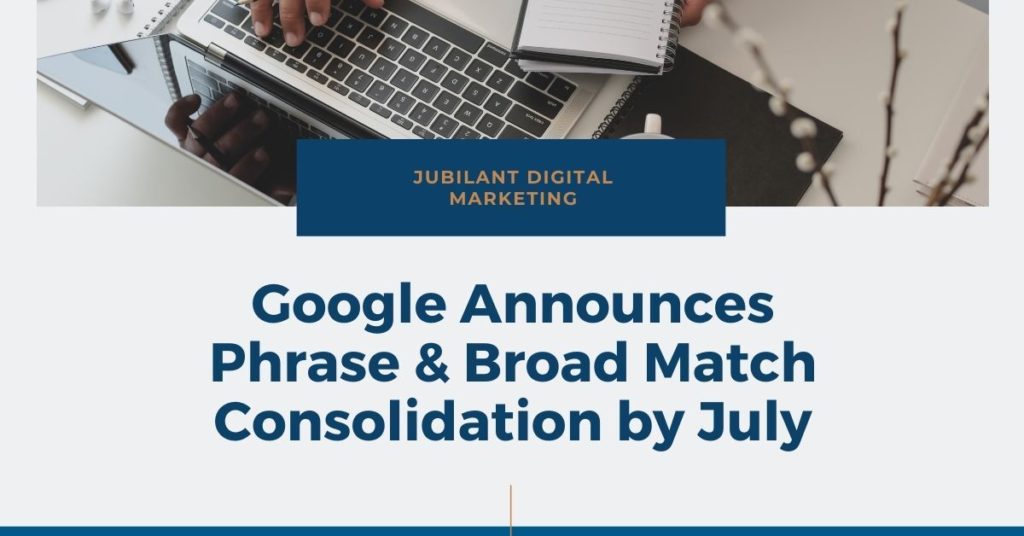
Beginning February 18, 2021, phrase match keywords and broad match modifier keywords will match the same traffic.
In a two-part rollout, Google has announced that by July 2021 broad match modifier keywords will be entirely replaced by phrase match. This new keyword update is intended to distinguish the intent of the user.
These changes “…will continue to respect word order when it’s important to meaning,” said Google.
Currently, broad match modifier requires all terms must be present within a search while phrase match requires the terms to be present and in a set order.
After the update takes place, phrase match will encompass both requirements while leaving it up to Google to determine whether the word order is important.
“Your keywords can now match to the meaning of a search, and broad match is now more effective at driving performance,” said Google.
Google provided an example of a moving company in New York City that was only interested in reaching searchers moving out of the city.
As a result of the new update, the moving company should be able to reach just people looking to move from New York City to Boston instead of those looking to move from Boston to New York City.
“For years, we’ve improved our understanding of intent to make it easier for you to reach your customers,” said Google. “With these improvements, we’ve seen that phrase match and broad match modifier often serve the same uses, and that you can reach more of the right customers through a combination of the two.”
For now, advertisers do not have to take any action in particular, but stay tuned for more updates to come as the full transition happens in July.
Performance data will remain where it is and since the update is happening to both phrase match and broad match modifier match types, advertisers will not need to immediately migrate keywords.
“The change could, potentially, save advertisers time managing keywords, but there is sure to be a lot of time spent recalibrating campaigns,” said Search Engine Land. “Traffic may fluctuate as these changes rollout, so advertisers should keep an eye on their performance metrics so they can make the necessary adjustments.”
In fact, advertisers may find this update is similar to the changes that occurred with text ads to expanded text ads.
With both updates, ads continued to serve but paid search managers were no longer able to create new ones.
“In July, once the new behavior has been rolled out globally, you’ll no longer be able to create new broad match modifier keywords. However, existing broad match modifier keywords will continue to serve under the new behavior. That’s why starting now, we recommend creating new keywords in phrase match going forward,” said Google.
Although the update is intended to save time in the future, it’s reasonable to expect some changes to current accounts.
The goal of streamlining match types is aimed at helping save time managing specific keywords. Advertisers can also expect to see notices regarding duplicate keywords which can be minimized by electing to reduce the number of keywords within accounts. Redundant keywords, that advertisers will see in Google, are called out in their “Recommendations” tab and can negatively impact performance. By reducing them, it will help Google’s automation and formulas run smoother and function with less clutter.
“This will also likely affect budgets, especially for accounts that allocate budget by match types or divide match types by Campaign or Ad Group,” said Search Engine Journal.
The update is also geared towards providing more relevant searches.
To do so, broad match will begin to look at additional signals within the Google Ads account to achieve relevancy.
“These signals include landing pages and keywords in your ad group,” according to Search Engine Land.
As a whole, the update is geared towards consolidating the platform and making it less complex.
But, in the past, Google has also made efforts to move advertisers away from focusing solely on the keyword level of search.
“Brands have wondered for years if Google will achieve a ‘no keyword needed’ environment,” said Search Engine Journal. “While that is still up for debate, they are certainly trying to consolidate and streamline that part of their platform.”
Over time, Google has minimized the control match types previously offered while also making an effort to provide more accurate automation.
Updates on keyword match types have been made consistently since 2014.
“Keyword matching is now more predictable,” said Search Engine Land. “An exact match keyword that is identical to the query will always take priority as long as it’s eligible to match.”
At Jubilant Digital Marketing, our Paid Search Team will continue to keep a close eye on each campaign. We’re excited to see how this update might help us evolve our strategies and how we can use it to our advantage. If you have any questions about this update, feel free to contact us for more information. We’re constantly researching and implementing the most cutting-edge paid search tactics to better our clients’ campaigns. Give us a call at 913-276-5800 if you need help keeping your campaign current and optimized for the best results.






